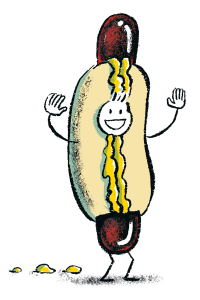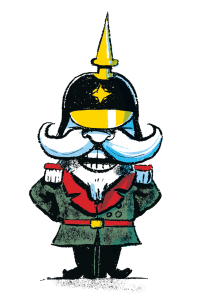Nazi jokes: Feared by the Germans, embraced by the Dutch
-
 Illustratie: Roel Venderbosch
Illustratie: Roel Venderbosch
How come Dutch people still enjoy Nazi jokes in the year 2023, but Germans fail to find them funny? And is it ok to make fun of Hitler?
Put a German in a group of jolly Dutch people and chances are that before long someone will ask him: when will I get my bike back? Hilarity all around. The war may have been over for almost 80 years, but Nazi jokes are still commonplace.
This article is part of the newest Vox paper edition, now available everywhere on campus. In this edition, we’re looking for both similarities and differences between German and Dutch citizens. Or: does the stereotypical German even exist?
A small sample among the Vox editors – two young German colleagues – reveals that Germans do not consider the cycling joke as a thigh-slapper. German-born cultural expert Yvonne Delhey can’t really laugh about it either. She was once in a wellness centre with a friend, they were speaking German, when a complete stranger from the Netherlands shouted that joke at them across the room. She couldn’t see the speaker through the steam in the room.
Delhey has lived and worked in the Netherlands for 30 years. This experience has taught her that Nazi humour is part of the deal here. In Germany, you would never hear jokes like this.
Responsibility
‘The first time I heard someone tell a Nazi joke, I was shocked,’ says one of our German colleagues on the Vox editorial board. ‘It was only after living in the Netherlands for a while that I understood that this is normal.’

Why is it shocking? ‘Because in Germany, we are taken to visit a concentration camp three times in secondary school alone,’ says our Vox colleague. ‘It’s instilled in us from childhood what the Germans did in the war, and the fact that we are responsible for making sure that this kind of thing never happens again.’
Joking about the suffering of victims has no place in this context. Germans, including the younger generations, simply live with a great sense of guilt. Delhey: ‘How far you can go with humor is directly related to society’s collective memory. It has to do with how a society sees itself.’
Where the Second World War is concerned, the German people still see themselves as the bad guy. Delhey also learned this in school. ‘If you go through life as a German, you carry that past with you. And it’s reinforced by the way other people respond to you. Being German is not something other people initially associate with something positive.’
Gas bottle
So making jokes about the war when you’re on the ‘perpetrator side’ of a fraught history can quickly be experienced as going too far. The other Vox colleague of German origin shares how Dutch friends still sometimes joke with him when a gas bottle is produced at a campsite or festival site (’As a German, you know how to deal with that!’). He would never dare to make a joke like this himself.
‘There’s a strong tradition in the Netherlands of blunt jokes that are on the edge of what’s acceptable’
Humour researcher Ivo Nieuwenhuis who, like Delhey, works at the Radboud University Faculty of Arts, calls this the ‘hypercorrectness of Germans’. They will generally avoid saying things that could be misconstrued, whereas the Dutch like to shock. Take comedian Theo Maassen, who made jokes about the Holocaust in one of his shows and got the audience on his side when he shared that he’d actually wanted to wear a T-shirt that said ‘My grandparents went to Auschwitz and all I got was this lousy T-shirt’.

Nieuwenhuis focuses on Dutch humour in particular. ‘There’s a strong tradition in the Netherlands of blunt jokes that are on the edge of what’s acceptable,’ he says. Jokes that make the audience think, ‘oh oh, ha ha, is it even OK to say what you’re saying there?’ Provocative humour became the norm starting in the 1960s, led by comedians like Freek de Jonge and broadcasters like the VPRO. Whereas until then, the Dutch had been very proper and church-oriented, suddenly all sacred cows had to be overthrown. Criticising royalty and religion was something new and fun.
Every country has its own brand of humour, so it could also be that our eastern neighbours simply don’t find the blunt Dutch jokes funny, whether they are about the war or not. Or don’t Germans have any humour at all? Of course, this prejudice is very much alive on our side of the border. Opel recently capitalised on this in a TV ad, in which a woman is saying that the car dealer must be joking when he mentions the price of the new Vauxhall Karl. The dealer answers in a strong German accent: ‘Germans don’t joke.’
Adolf Hitler

Yvonne Delhey is convinced that Germans do have a sense of humour. ‘But I haven’t done any research on it.’ What she did investigate was how humour can help make difficult topics approachable in public discourse. In particular, she charted Hitler parodies. ‘In the 1990s, German cartoonist Walter Moers published the book Adolf, die Nazisau,’ she says. ‘In this book, Hitler is the size of a gnome and is portrayed as a completely idiotic figure, who, among other things, has sex with a transgender prostitute called Hermine Göring.’ In a 2013 US comic series entitled Hipster Hitler, Hitler wears skinny jeans, and both the Third Reich and hipsters are made fun of.
But of course, the most famous example of jokes at Hitler’s expense is the film Er ist wieder da, which was a huge blockbuster in 2015. It was preceded by a book about the Führer waking up on a Berlin lawn in 2011, not being taken seriously by anyone and eventually becoming a TV star. Delhey: ‘That book was on the bestseller lists in Germany for weeks, but reviewers did virtually nothing with it. Very silly, I thought.’ In the meantime, the Volkskrant had already published a full-page article even before the book was translated into Dutch.

German critics were afraid, among other things, that the real Nazi propaganda used by the author could stir up still dormant sentiments.
Delhey uses the book in a course she teaches to students. She had them read it out loud. Because Er ist wieder da is written in the first-person form, it immediately feels uncomfortable to speak aloud the thoughts of a violent dictator who killed millions. And it is precisely there that a conversation emerges, in Delhey’s experience.
As time passes, the collective memory of a people changes. Recently, Delhey came across a rubber duck of Napoleon in a shop. Few would take offence at this amusing portrayal of a killer with over three million deaths on his conscience. He’s been dead for two hundred years, and there is no one left with a personal memory of him and the terror he caused. While there are still Holocaust survivors telling their stories and SS men serving sentences for their war crimes, which is why Hitler is a much more sensitive topic.
Hardworking people
Over the past 80 years, the term Nazi has already changed its meaning worldwide. ‘Putin and Trump are also called Nazis,’ Delhey said. ‘It has become a common swear word.’ Or take New Zealand’s outgoing prime minister, Jacinda Ardern. She made COVID-19 vaccination mandatory and was subsequently depicted by anti-vaxers on posters with a Hitler moustache.

Former Chancellor Angela Merkel was once given the same honour in the Turkish media, after President Recep Erdo˘gan accused her of ‘Nazi practices’. The term ‘language Nazi’ is also fairly well established in the Netherlands in the year 2023, to mean a person who obsessively highlights language errors in other people’s texts.
By now, the two sample Germans on the Vox editorial board are used to laughing along when subjected to a bicycle joke. ‘I understand now that it’s not meant personally,’ one of them says.
The question remains why the Dutch find it so funny to keep referring to the war, even 80 years after the fact. According to Delhey, this has to do with the image the Dutch have of themselves as a hardworking people who are sober and strict in their doctrine. ‘The Dutch enjoy teaching others a lesson. With these jokes, they still want to show that they aren’t to blame, but that the Germans are.’




